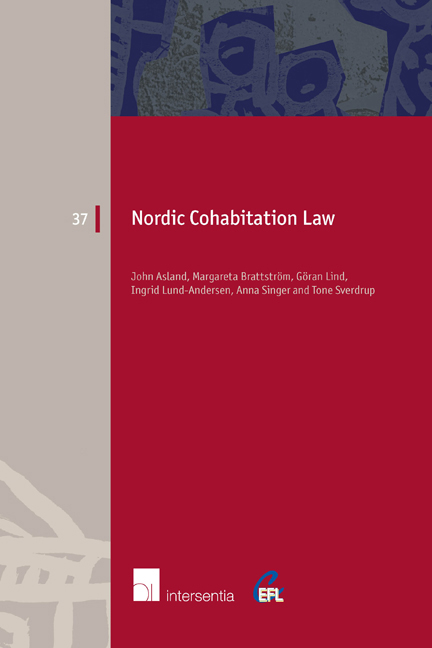Book contents
- Frontmatter
- Preface
- Contents
- Table of Cases
- List of Abbreviations
- Chapter 1 The Development of Cohabitation and Cohabitation Law in the Nordic Countries
- Chapter 2 Property Issues in Cohabitation Relationships
- Chapter 3 Financial Settlements on Termination of Cohabitation
- Chapter 4 The Legal Position of the Surviving Cohabitant
- Chapter 5 The Relevance of Cohabitation for Parental Rights
- Chapter 6 The Distinctive Legal Nature of Cohabitation Relationships and the Need for Legislation
- Chapter 7 Discussion of Legal Policy: Principles for Regulating Cohabitation Relationships
- References
- About the Authors
- European Family Law Series
Chapter 3 - Financial Settlements on Termination of Cohabitation
Published online by Cambridge University Press: 13 December 2017
- Frontmatter
- Preface
- Contents
- Table of Cases
- List of Abbreviations
- Chapter 1 The Development of Cohabitation and Cohabitation Law in the Nordic Countries
- Chapter 2 Property Issues in Cohabitation Relationships
- Chapter 3 Financial Settlements on Termination of Cohabitation
- Chapter 4 The Legal Position of the Surviving Cohabitant
- Chapter 5 The Relevance of Cohabitation for Parental Rights
- Chapter 6 The Distinctive Legal Nature of Cohabitation Relationships and the Need for Legislation
- Chapter 7 Discussion of Legal Policy: Principles for Regulating Cohabitation Relationships
- References
- About the Authors
- European Family Law Series
Summary
INTRODUCTION: THE MAIN FEATURE OF THE LEGAL STATUS OF COHABITANTS
Statement of assets and liabilities: When a cohabitation relationship ends, the starting point is that each party retains their own assets and liabilities. This applies in all Nordic countries and is directly laid down in section 5 of the Finnish Act on the Dissolution of the Household of Cohabiting Partners (Lagen om upplösning av sambors gemensamma hushåll). When cohabitation is terminated or when one of the parties dies, it is necessary to draw up a statement of what each party owns, whether there is a shared debt, and whether one party has a claim against the other. If the parties own property jointly, each can request the joint ownership to be terminated.
Reciprocal claims: If one of the parties in a cohabitation relationship has transferred an amount to the other, there can arise a question of whether it is possible to make a claim on the grounds of such transfer. A claim will be dismissed if the amount transferred is regarded as a contribution to the shared household expenses or a gift. On the other hand it may be recognised as a normal claim under property law, such as a claim based on the doctrine of unjust enrichment or a claim for the repayment of a loan. However, it is more usual for the financially worse off cohabitant to seek an amount under the rules on the financial circumstances of cohabitants or as a special kind of claim which the courts have recognised within the context of cohabitation relationships. This may be because an asset is regarded as being jointly owned by the parties from a particular family property law perspective, or as a claim for compensation, consideration or reimbursement. Each of the Nordic countries has its own legal solutions which differ materially. What is common to them is that these cases are often subject to a special assessment because of the closeness of the couple's relationship. While each country pursues the overall aim of ensuring the reasonable division of property when cohabitation comes to an end, the resulting divisions can be surprisingly different.
Legislation of the assessment of the property of cohabitants: For many years Sweden was the only Nordic country with special legislation on the financial circumstances of cohabitants on the termination of cohabitation. The Swedish Cohabitation Act (Sambolagen) 1987 was revised in 2003.
- Type
- Chapter
- Information
- Nordic Cohabitation Law , pp. 109 - 160Publisher: IntersentiaPrint publication year: 2015



